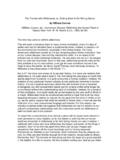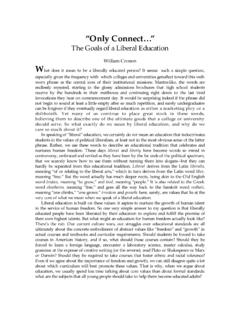Transcription of by William Cronon
1 The trouble with wilderness ; or, Getting Back to the Wrong Nature by William Cronon ( William Cronon , ed., Uncommon Ground: Rethinking the Human Place in Nature, New York: W. W. Norton & Co., 1995, 69-90) The time has come to rethink wilderness . This will seem a heretical claim to many environmentalists, since the idea of wilderness has for decades been a fundamental tenet indeed, a passion of the environmental movement, especially in the United States. For many Americans wilderness stands as the last remaining place where civilization, that all too human disease, has not fully infected the earth. It is an island in the polluted sea of urban-industrial modernity, the one place we can turn for escape from our own too-muchness. Seen in this way, wilderness presents itself as the best antidote to our human selves, a refuge we must somehow recover if we hope to save the planet. As Henry David Thoreau once famously declared, In Wildness is the preservation of the World. (1) But is it?
2 The more one knows of its peculiar history, the more one realizes that wilderness is not quite what it seems. Far from being the one place on earth that stands apart from humanity, it is quite profoundly a human creation indeed, the creation of very particular human cultures at very particular moments in human history. It is not a pristine sanctuary where the last remnant of an untouched, endangered, but still transcendent nature can for at least a little while longer be encountered without the contaminating taint of civilization. Instead, it s a product of that civilization, and could hardly be contaminated by the very stuff of which it is made. wilderness hides its unnaturalness behind a mask that is all the more beguiling because it seems so natural. As we gaze into the mirror it holds up for us, we too easily imagine that what we behold is Nature when in fact we see the reflection of our own unexamined longings and desires. For this reason, we mistake ourselves when we suppose that wilderness can be the solution to our culture s problematic relationships with the nonhuman world, for wilderness is itself no small part of the problem.
3 To assert the unnaturalness of so natural a place will no doubt seem absurd or even perverse to many readers, so let me hasten to add that the nonhuman world we encounter in wilderness is far from being merely our own invention. I celebrate with others who love wilderness the beauty and power of the things it contains. Each of us who has spent time there can conjure images and sensations that seem all the more hauntingly real for having engraved themselves so indelibly on our memories. Such memories may be uniquely our own, but they are also familiar enough be to be instantly recognizable to others. Remember this? The torrents of mist shoot out from the base of a great waterfall in the depths of a Sierra canyon, the tiny droplets cooling your face as you listen Cronon , trouble with wilderness , Page 2 to the roar of the water and gaze up toward the sky through a rainbow that hovers just out of reach. Remember this too: looking out across a desert canyon in the evening air, the only sound a lone raven calling in the distance, the rock walls dropping away into a chasm so deep that its bottom all but vanishes as you squint into the amber light of the setting sun.
4 And this: the moment beside the trail as you sit on a sandstone ledge, your boots damp with the morning dew while you take in the rich smell of the pines, and the small red fox or maybe for you it was a raccoon or a coyote or a deer that suddenly ambles across your path, stopping for a long moment to gaze in your direction with cautious indifference before continuing on its way. Remember the feelings of such moments, and you will know as well as I do that you were in the presence of something irreducibly nonhuman, something profoundly Other than yourself wilderness is made of that too. And yet: what brought each of us to the places where such memories became possible is entirely a cultural invention. Go back 250 years in American and European history, and you do not find nearly so many people wandering around remote corners of the planet looking for what today we would call the wilderness experience. As late as the eighteenth century, the most common usage of the word wilderness in the English language referred to landscapes that generally carried adjectives far different from the ones they attract today.
5 To be a wilderness then was to be deserted, savage, desolate, barren in short, a waste, the word s nearest synonym. Its connotations were anything but positive, and the emotion one was most likely to feel in its presence was bewilderment or terror. (2) Many of the word s strongest associations then were biblical, for it is used over and over again in the King James Version to refer to places on the margins of civilization where it is all too easy to lose oneself in moral confusion and despair. The wilderness was where Moses had wandered with his people for forty years, and where they had nearly abandoned their God to worship a golden idol. (3) For Pharaoh will say of the Children of Israel, we read in Exodus, They are entangled in the land, the wilderness hath shut them in. (4) The wilderness was where Christ had struggled with the devil and endured his temptations: And immediately the Spirit driveth him into the wilderness . And he was there in the wilderness for forty days tempted of Satan; and was with the wild beasts; and the angels ministered unto him.
6 (5) The delicious Paradise of John Milton s Eden was surrounded by a steep wilderness , whose hairy sides /Access denied to all who sought entry. When Adam and Eve were driven from that garden, the world they entered was a wilderness that only their labor and pain could redeem. wilderness , in short, was a place to which one came only against one s will, and always in fear and trembling. Whatever value it might have arose solely from the possibility that it might be reclaimed and turned toward human ends planted as a garden, say, or a city upon a hill. (7) In its raw state, it had little or nothing to offer civilized men and women. Cronon , trouble with wilderness , Page 3 But by the end of the nineteenth century, all this had changed. The wastelands that had once seemed worthless had for some people come to seem almost beyond price. That Thoreau in 1862 could declare wildness to be the preservation of the world suggests the sea change that was going on. wilderness had once been the antithesis of all that was orderly and good it had been the darkness, one might say, on the far side of the garden wall and yet now it was frequently likened to Eden itself.
7 When John Muir arrived in the Sierra Nevada in 1869, he would declare, No description of Heaven that I have ever heard or read of seems half so fine. (8) He was hardly alone in expressing such emotions. One by one, various corners of the American map came to be designated as sites whose wild beauty was so spectacular that a growing number of citizens had to visit and see them for themselves. Niagara Falls was the first to undergo this transformation, but it was soon followed by the Catskills, the Adirondacks, Yosemite, Yellowstone, and others. Yosemite was deeded by the U. S. government to the state of California in 1864 as the nation s first wildland park, and Yellowstone became the first true national park in 1872. (9) By the first decade of the twentieth century, in the single most famous episode in American conservation history, a national debate had exploded over whether the city of San Francisco should be permitted to augment its water supply by damming the Tuolumne River in Hetch Hetchy valley, well within the boundaries of Yosemite National Park.
8 The dam was eventually built, but what today seems no less significant is that so many people fought to prevent its completion. Even as the fight was being lost, Hetch Hetchy became the baffle cry of an emerging movement to preserve wilderness . Fifty years earlier, such opposition would have been unthinkable. Few would have questioned the merits of reclaiming a wasteland like this in order to put it to human use. Now the defenders of Hetch Hetchy attracted widespread national attention by portraying such an act not as improvement or progress but as desecration and vandalism. Lest one doubt that the old biblical metaphors had been turned completely on their heads, listen to John Muir attack the dam s defenders. Their arguments, he wrote, are curiously like those of the devil, devised for the destruction of the first garden so much of the very best Eden fruit going to waste; so much of the best Tuolumne water and Tuolumne scenery going to waste. (10) For Muir and the growing number of Americans who shared his views, Satan s home had become God s Own Temple.
9 The sources of this rather astonishing transformation were many, but for the purposes of this essay they can be gathered under two broad headings: the sublime and the frontier. Of the two, the sublime is the older and more pervasive cultural construct, being one of the most important expressions of that broad transatlantic movement we today label as romanticism; the frontier is more peculiarly American, though it too had its European antecedents and parallels. The two converged to remake wilderness in their own image, freighting it with moral values and cultural symbols that it carries to this day. Indeed, it is not too much to say that the modern environmental movement is itself a grandchild of romanticism and post-frontier ideology, which is why it is no accident that so Cronon , trouble with wilderness , Page 4 much environmentalist discourse takes its bearings from the wilderness these intellectual movements helped create. Although wilderness may today seem to be just one environmental concern among many, it in fact serves as the foundation for a long list of other such concerns that on their face seem quite remote from it.
10 That is why its influence is so pervasive and, potentially, so insidious. To gain such remarkable influence, the concept of wilderness had to become loaded with some of the deepest core values of the culture that created and idealized it: it had to become sacred. This possibility had been present in wilderness even in the days when it had been a place of spiritual danger and moral temptation. If Satan was there, then so was Christ, who had found angels as well as wild beasts during His sojourn in the desert. In the wilderness the boundaries between human and nonhuman, between natural and supernatural, had always seemed less certain than elsewhere. This was why the early Christian saints and mystics had often emulated Christ s desert retreat as they sought to experience for themselves the visions and spiritual testing He had endured. One might meet devils and run the risk of losing one s soul in such a place, but one might also meet God. For some that possibility was worth almost any price.






